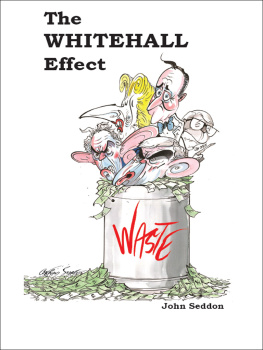Published in the first edition in 2008 by:
Triarchy Press
Station Offices
Station Yard
Axminster EX13 5PF
United Kingdom
+44(0)1297 631456
www.triarchypress.com
Reprinted 2008, 2009, 2010.
Published as eBook by Triarchy Press in 2010.
Copyright John Seddon
The right of John Seddon to be identified as the author of this book has been asserted by him in accordance with the Copyright, Designs and Patents Act, 1988.
All rights reserved.
No part of this publication may be reproduced, stored in a retrieval system or transmitted in any form or by any means including photocopying, electronic, mechanical, recording or otherwise, without the prior consent of the publisher.
A catalogue record for this book is available from the British Library.
Cover design and image by Heather Fallows - www.whitespacegallery.org.uk
ISBN: 978-1-908009-00-5
Introduction
He [Tony Blair] was determined to cut drastically the bureaucracy and red tape which he said were killing people in the front line and were a political Achilles heel.1
The purpose of this book is to illustrate how bureaucracy and red tape have driven public services in the wrong direction. The cost is not just the cost of the bureaucracy itself; there is an additional cost because the changes being mandated by that bureaucracy are the wrong things to do. The bureaucracy has made services worse, and public sector morale has been sapped.
If investment in the UK public sector has not been matched by improvement, it is because we have invested in the wrong things. We invest in the wrong things believing them to be the right things. We think inspection drives improvement, we believe in the notion of economies of scale, we think choice and quasi-markets are levers for improvement, we believe people can be motivated with incentives, we think leaders need visions, managers need targets, and information technology is a driver of change. These are all wrong-headed ideas. But they have been the foundation of public-sector reform.
These plausible but essentially wrong ideas have been promulgated through a massive specifications and inspection industry. There are now many thousands of people engaged in telling others what to do and inspecting them for compliance. Public services have requirements placed on them by a plethora of bodies, the biggest single weakness of which, common to them all, is that they are based on opinion rather than knowledge. The regime, ignorant of this essential shortcoming, legitimises the role of the many specifiers by giving them the power to demand compliance. This is dysfunctionality of a high order.
To understand how dysfunctional the regime and its associated thinking is, it is necessary to learn to take a different view. The better way is based on the principles and practices of systems thinking. It is a powerful way to understand how services work and to improve them; it exposes the problems with conventional thinking. That is all that holds us back. We have to learn that we got it wrong then do the right thing.
Admitting that they got it wrong is a tall order for politicians, but an admission that is essential if we are to move forward and reverse the debacle that has been public-sector reform.
Every public service about which we (in Vanguard) have knowledge has been burdened with specifications, regulations, targets and the like which are actually making performance worse. If you wonder where the money has gone, much of it has been spent on undermining performance and morale: tragic unintended consequences of reform. Lets be clear. This is not an argument for improving the regimes specifications: it is an argument for radically changing the regime to get rid of the specifications altogether.
Overview of the book
The reform regime has its origins in economic theory. Quasi-markets, choice and incentives are assumed to be the means for improvement; but is economics a science providing knowledge or merely a collection of ideas and ideologies? Plausible ideas have become translated into policy. While economists are beginning to have their doubts, politicians continue to pursue these ideologies without caution. explains the emergence of the new ideology.
illustrates a service that was elevated to national interest because it includes the word choice choice-based lettings in housing. Choice was a prime ministerial passion, central to the ideology. We learn that to follow the specification leads to worse service and high costs. But such is the political imperative of finding evidence of choice in action that the reform regime seeks compliance over improvement.
provides a second practical example: housing benefits, which is a service provided by local authorities. Housing benefits is a good illustration of the general problem: a design for the service has been promulgated throughout the country from the centre, and local authorities are inspected to ensure compliance. The problem is that the design is wrong, in the sense that it provides poor service to customers (claimants) and increases costs.
I shall show that the same problem applies to other services as the book progresses. This particular analysis applies to the public sector in general; every service is subject to specifications, inspection, targets, and incentives, founded on an implicitly negative view of the public servant and human nature. It is these things that are making services worse.
In I turn to the present style of management: command-and-control thinking. In the public sector, this means managers being persuaded to believe in economies of scale, call centres, back offices, outsourcing and shared services. Described by command-and-control thinkers as no-brainers with obvious logic, these ideas are, in fact, deceptive and dangerous. I shall illustrate how designs based on command-and-control thinking both create and hide waste which explains the phenomenon (incomprehensible to government ministers) of public services simultaneously getting high star ratings from officialdom and a resounding raspberry from the public.
gives an overview of the systems approach to designing and managing services. Instead of creating functional, command-and-control hierarchies, the systems approach is to design against demand to enable customers to pull value from the system. In this way, costs fall as service improves, a proposition that is entirely counterintuitive to the command-and-control mindset.
A central idea in systems thinking is the relationship between purpose, measures and method. illustrates the relationship with examples from a number of services. Briefly, by imposing targets the regime creates a purpose (to make the numbers) and constrains method (the way services are designed). By contrast, if you derive measures from purpose from the customers point of view, then you liberate method: innovation and improvement follow.
A central feature of the reform programme has been targets. explains why targets do not work something ministers still fail to grasp. They sense that something is wrong, so their solution is to have fewer of them. But doing less of the wrong thing is not doing the right thing. Believing in targets is irrational: as I show by analysing arguments commonly used to defend them.
describes what has happened to policing as a consequence of deliverology.
shows what is learned when an important service social care (helping people live with dignity in their own homes) is studied from a systems perspective. A product of the regime, social care services have all the features ministers require: call centres, electronic records, targets, specifications, reporting and outsourcing. As a direct consequence of this factory system, care services carry high costs and provide a quality of service that can only be described as shameful. The chapter demonstrates that care services cannot be improved without removing the regimes specifications, since star ratings and inspection systems fail to recognise the reality of the service from the users point of view.











